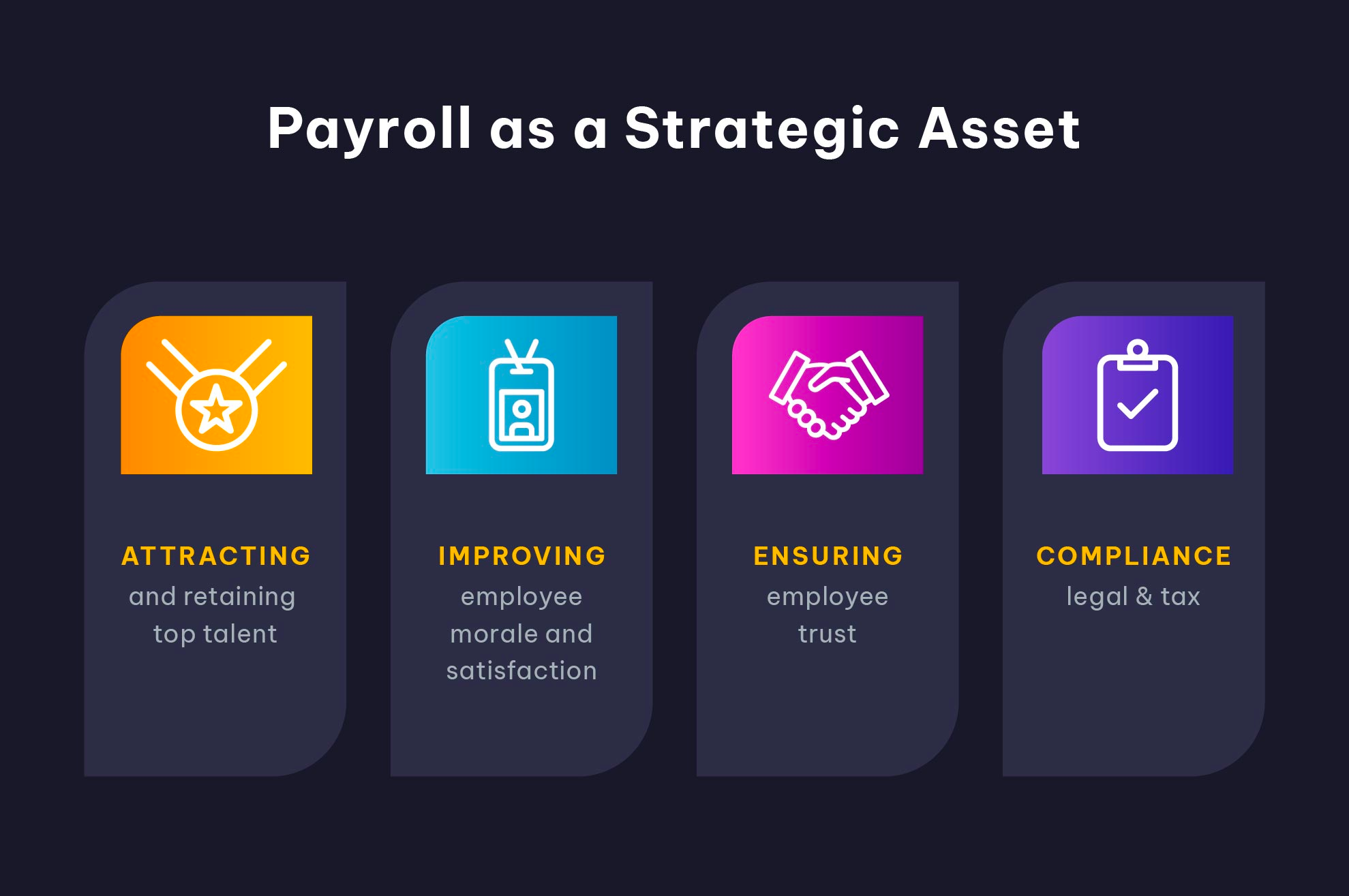Make Payroll A Strategic Asset For Your Global Company

Tiffany Appleby
UKG Inc., a leading provider of HR, payroll, and workforce management solutions announces entering into a definitive agreement to acquire Immedis. Read More

Payroll is a vital component of any business, and for a global company, it becomes even more strategic. Payroll process affects employees, and firms with strong global payroll will find it easier to attract and hold the best employees, while navigating the complex pitfalls of international tax compliance and payroll data regulations. Because of this, payroll is a valuable asset for global companies.
A strategic asset is any resource that a company owns in order to manage their operations and improve their position in the marketplace. Strategic assets tend to be tailored to a company’s unique set of needs, serve specific purposes, and are difficult to replace. They can be anything from intangible assets like brand names and logos, to fixed assets like physical locations, hardware, and warehouses.
Although invisible to customers, payroll lies at the heart of a company's entire operations. Proper handling of global payroll data ensures that employees are paid correctly, while protecting the business to stay compliant with local laws and regulations.
Immedis’ research has proven the significance of payroll on employee behavior. Two payroll data errors will cause 49% of employees to start looking for a different job. A full 54% of Americans have payroll problems. And over half of employees are looking for new jobs now that the pandemic has eased.
When it comes to payroll, employer sentiment is extremely fragile. Employees need to be treated with respect, and their payslip is the most explicit indication of respect from the company. It is, after all, their primary reason for showing up at work in the first place. It needs to be done correctly every time, or else employees will feel unhappy.

Like anything else, payroll accuracy is challenging to coordinate on a global scale. Global payroll providers face many complications, including:
One key challenge is currency conversion and exchange rates across multiple countries. For example, if a company has operations in the United States and Europe, it must ensure that it is accurately converting and paying employee salaries in both USD and EUR. This could necessitate separate bank accounts holding each currency.
Another challenge is the differences in tax laws and regulations between countries. Global companies must ensure that they are complying with the specific norms in each country where they have operations, which can be a complex and time-consuming process.
Managing a payroll process for remote and international employees can also be a challenge, as it may involve transferring funds across borders and dealing with different banking systems and processes. Not all banks are positioned for international communication on the scale necessary for global companies.
To address these challenges, global companies can turn to automation and technology solutions. Payroll software that can handle multiple currencies and conform to distinct tax laws will streamline payroll processes to make it easier to manage payroll for employees in different countries.
Additionally, centralized reporting systems can help global companies get a holistic view of their payroll data and payroll operations to identify areas for improvement.
Payroll performs a strategic function for global companies in several ways:

If a company has a reputation for paying its employees fairly and on time, it may be more successful in attracting strong employees compared to a company with less reliable payroll processes. In addition, efficient and timely payroll processing makes employees feel valued and fairly compensated, which can help to retain top talent and reduce employee turnover.
If employees are not paid accurately or on time, this can lead to frustration and decreased morale. On the other hand, smooth payroll can help to build trust with employees and increase their satisfaction with their job and the company. Employee engagement is crucial for company functioning- only an estimated 15% of US workers are fully engaged with their jobs, and this costs businesses up to $550 billion per year.
If employees do not trust that they will be paid accurately or on time, it can lead to decreased motivation and productivity. It can even lead to outright negligence or theft. Reliable payroll operations help to build trust with employees and demonstrate the company's commitment to paying them fairly and on time.
Global companies must navigate different tax laws and employee data regulations in each country where they have operations, and an effective payroll process is crucial in ensuring compliance with these laws. Non-compliance can result in fines and penalties, which will negatively impact a company's reputation and bottom line.
Traditionally, managing payroll for a company with a global presence has always been a complex and time-consuming task. It involves complying with various local tax laws, exchange rates, and employee data and benefits regulations in each country where the company operates.

This can be overwhelming for HR and finance teams, who must constantly stay updated on changes in legislation to ensure that they are in compliance.
But staying on top of regulations outside the company is only half the battle. The real power of global payroll is using it as a tool to make workers happier and more motivated. This is especially important for companies with a diverse workforce, as it ensures that all employees are treated fairly and that there are no discrepancies in pay.
In addition to improving payroll data accuracy and fairness, global payroll professionals also help companies save time and money through payroll integration.
By automating many of the payroll tasks involved in payroll management, such as calculating taxes and processing benefits, global payroll operations can significantly reduce the workload of HR and finance teams. This frees up time and resources that can be used to focus on other important tasks, such as strategic planning and employee development.
Overall, modern global payroll systems place companies in a more effective position, both inside and out. It makes their employees more effective while removing conflict with regulators and governments.
Immedis Blog

.jpg)



.jpg)